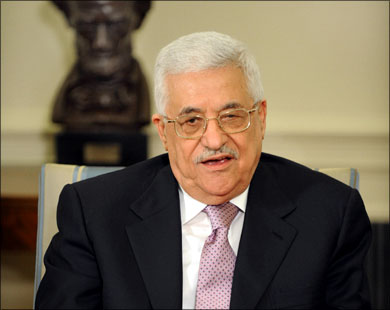Palestinian President Mahmoud Abbas rejected a call by US special envoy George Mitchell on Saturday to hold direct negotiations with Israel, Fatah member Mohammed Dahlan said.
During the three-hour meeting in the West Bank city of Ramallah, Mitchell "did not give Israeli responses to the Palestinian questions regarding borders and security," the Fatah Central Committee member said in a statement.
"Going to direct negotiations requires that there should be progress and clear Israeli answers regarding borders and security (...) In the absence of an Israeli response to these two issues, Fatah has not changed its position regarding its refusal to hold direct negotiations," Dahlan said.
US President Barack Obama had urged Abbas in a telephone call last week to move from the current indirect or proximity talks to direct negotiations with Israel.
The Palestinian Authority said it would start direct negotiations, suspended since December 2008, only after progress in the proximity talks on borders and security.
In an interview with a Jordanian newspaper, Abbas said Saturday that he would be ready to enter direct negotiations if Israel accepted a third party or international force to maintain security of the borders with the Palestinian state.
Mitchell said the aim of his visit was to press on with Obama's vision for a comprehensive peace in the Middle East, "which must begin with an agreement between Israel and Palestine that will provide for two states living side by side in peace and security."
That vision also includes peace between Israel and Syria and normalization of relations between Israel and "all the countries in the region," he said.
Mitchell said he looked forward to continuing his talks with all parties in the near future, adding he was "heartened by the discussion that we had here today and in the past several days."
The US envoy met Israeli Prime Minister Benjamin Netanyahu in Jerusalem on Friday.
Mitchell said he would be visiting "several other countries" in the region in an effort to gain support for the US peace plan.
The envoy also met Saturday with the European Union's foreign policy chief, Catherine Ashton, who arrived in Ramallah for talks with Palestinian Premier Salam Fayyad.
Ashton started a three-day visit to Israel, the West Bank and Gaza by announcing 40 million euros (52 million dollars) in direct aid to the Palestinian Authority.
During her second visit to the Gaza Strip this year Ashton is to inspect a summer camp and a school run by the United Nations Relief and Works Agency for Palestine, which is set to receive an additional 1 million euros in EU funding.
However, meetings with leaders of the Islamist Hamas group, which runs the Gaza Strip, are excluded from Sunday's schedule.
Israel normally shuts off the Palestinian enclave from international contact to avoid contact with Hamas, considered a terrorist organization by the EU and the United States.
Ashton is also set to meet Israeli Defence Minister Ehud Barak, Foreign Affairs Minister Avigdor Lieberman and Prime Minister Benjamin Netanyahu late Sunday.
Israeli media reported this week that Lieberman would be ready to make a proposal to Ashton to allow the international community to conduct security inspections of goods and people entering Gaza by land and sea.
Regarding supervising the crossings, Ashton said the EU will be willing to do that. She said, "We are ready to engage in work at the crossing only if there is a clear role for the EU." She said the "flow of people and goods is important to support business and the economy in Gaza."
Ashton will visit Ramallah again on Monday to meet President Abbas.






